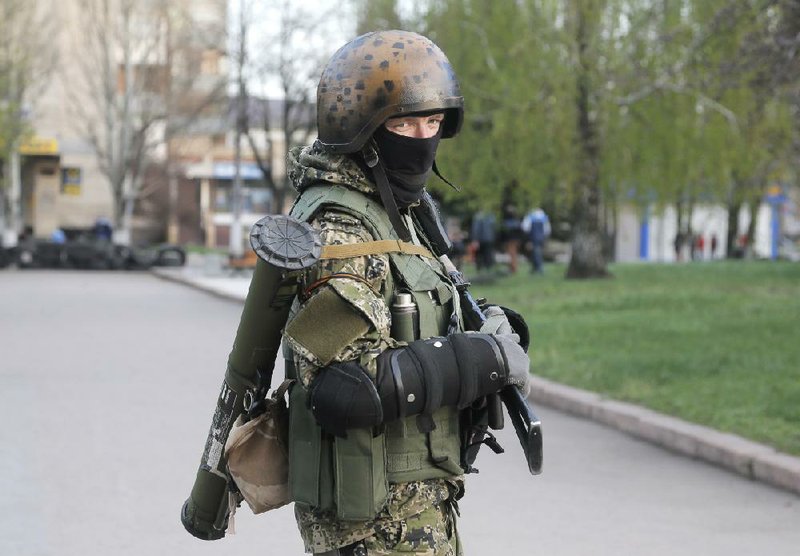DONETSK, Ukraine - The leader of a group of pro-Russian separatists said Friday that he would ignore an international agreement to de-escalate the political crisis in eastern Ukraine, saying his group would remain in the government buildings in the regional capital of Donetsk that it commandeered last weekend.
The agreement, announced Thursday by the United States, Russia, the European Union and Ukraine, called for all protesters to vacate the buildings they have occupied and to lay down their arms.
But Denis Pushilin, the leader of the separatist group in Donetsk, which has declared an independent People’s Republic of Donetsk that no nation has recognized, said his followers would not comply until the interim government in Kiev resigned. He repeated his group’s demand for a referendum on the region’s future, similar to the one that preceded the annexation of Crimea by Russia last month.
Pushilin’s group is one of many groups of pro-Russian militants that have seized buildings and arms in the east. His rejection highlighted a critical omission in the Geneva agreement.
Russia “did not sign anything for us,” Pushilin said at a news conference in Donetsk.
There was no immediate official reaction from the Kremlin.
Yulia Tymoshenko, a former Ukrainian prime minister and current presidential candidate formerly imprisoned by the country’s ousted pro-Russian government, made a surprise visit Friday to Donetsk. Tymoshenko, who has opposed closer ties to Russia, said at a news conference that she had gone to “listen to the complaints of the demonstrators.”
The Geneva agreement called on all illegal, armed groups in Ukraine to be disarmed. In addition, “all illegally seized buildings must be returned to legitimate owners; all illegally occupied streets, squares and other public places in Ukrainian cities and towns must be vacated,” the agreement says.
In exchange, the interim Ukrainian government agreed to grant amnesty to protesters who leave the government buildings they have occupied and give up their arms, unless they are suspected of murder or other capital crimes. The Kiev government also would ensure that constitutional revisions involve “outreach to all of Ukraine’s regions and political constituencies,” a reference to Russian speakers in the eastern part of the country.
Pushilin said he did not consider the new government in Kiev to be legitimate and said that if illegally occupied buildings are to be relinquished, then officials, including interim President Oleksandr Turchynov, should vacate the presidential administration building in the capital.
The central government has not pulled military forces back from Slovyansk, a town north of Donetsk that was seized by pro-Russian separatists a week ago. Pushilin said Kiev would use the Geneva agreement to stall on promised constitutional changes to grant eastern Ukrainian regions greater autonomy.
The Ukrainian authorities signaled Friday that they were moving ahead with one provision of the Geneva agreement. Interim Prime Minister Arseniy Yatsenyuk told the parliament on Friday morning that the government had drafted a law offering amnesty to protesters who leave occupied government buildings and lay down arms.
The diplomatic accord reached Thursday, while limited in scope, represented the first time Russia and Ukraine had found common ground since protests toppled a pro-Moscow government in Kiev, leading the Kremlin to annex the Crimean Peninsula and threaten other parts of Ukraine with 40,000 troops on its border.
But neither President Barack Obama in Washington nor President Vladimir Putin in Moscow signaled that the Ukrainian crisis was over. During a televised question-and-answer session before the agreement was announced, Putin asserted historic claims over Ukrainian territory and the right to send in Russian troops.
Speaking after the agreement was announced, Obama said it offered “a glimmer of hope” but “we’re not going to count on it,” and added that the United States would take more punitive action if Russia did not abide by its terms.
Tension on the ground continued to mount in the hours before the Geneva agreement was announced. Pro-Russian protesters tried to storm a Ukrainian base in the eastern city of Mariupol, prompting a firefight that left three of the activists dead, 13 wounded and 63 captured, according to Ukraine’s interim interior minister. In Donetsk, fliers appeared ordering Jews to register with the authorities.
The Geneva agreement also called on all sides in Ukraine to refrain from violence or provocative behavior and rejected all forms of intolerance, including anti-Semitism.
The agreement did not require Russia to remove its troops from the border, nor did it commit Moscow to hold direct talks with Ukrainian officials, two of Obama’s demands. Moreover, the agreement made no mention of Russia’s seizure and annexation of Crimea, an action deemed unacceptable by the United States and Europe.
Front Section, Pages 6 on 04/19/2014

